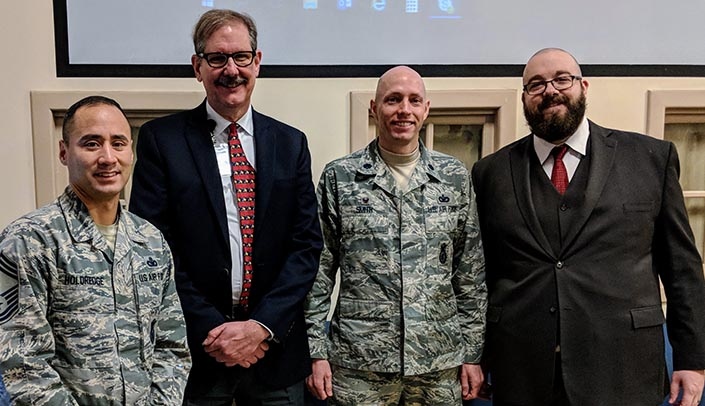It’s been a busy 18 months for Steven Wengel, M.D., assistant vice chancellor for campus wellness, and Jonathon Sikorski, Ph.D., director of wellness education.
Drs. Wengel and Sikorski have been doing outreach presentations on dealing with stress to organizations such as the Nebraska National Guard, Omaha Metropolitan Chiefs of Police Association, Offutt Air Force Base security personnel and others. They have done more than 50 invited lectures over the past 18 months.
The outreach presentations are an offshoot of ongoing campus efforts to provide stress-relieving strategies to students, faculty and staff at UNMC and Nebraska Medicine, which focus on dealing with anxiety, stress and burnout. In total. they have given more than 50 invited lectures to over 2900 attendees in the past 18 months across UNMC and the greater Omaha area.
Following their presentation to the Metro Chiefs, they saw a lot of interest from other “first responder” organizations.
“First responders, officers, military, and special agents routinely have their lives interrupted by the services they provide,” Dr. Sikorski said. “Depending on the call, they may need to drop everything and report for duty. This pulls their attention away from their families. Additionally, once they return from service or a call, they are expected to switch hats into family mode. Mindfulness and meditation are not going to make their jobs any easier, but can help them return to baseline and de-stress after a stressful event. ”
“So that’s one unifying theme for these entities,” Dr. Wengel said. “These are people at the tip of the sword, who are first responders in really difficult situations.”
“It’s a community service, because we work for the state of Nebraska, so it’s an important part of our mission to reach out to people who are asking us for help, as much as we can,” Dr. Wengel said.
The presentations have created a grassroots level of interest that has led to more requests from entities beyond first responders, as well, such as Creighton University and Nebraska schools. School districts across the state also have approached the pair.
The next step, they said, is to build a program at UNMC to do stress management research.
“For millennia, the negative impacts of stress are well documented, and the positive impact of meditation and gratitude are coming to light in neuroscience, ” Dr. Sikorski said. “But how does it help you, what does it do to the brain exactly? You can’t just meditate out of a stressful environment — we need to know how mindfulness can impact the culture in which we work. There’s little research information, and we need to figure out what’s the right dose of these various strategies.”
They point out that the American Heart Association has a defined amount of exercise they recommend for every American, but nobody knows the right dose of meditation to make a person healthy.
“We want to answer that question here,” Dr. Wengel said.

Awesome!